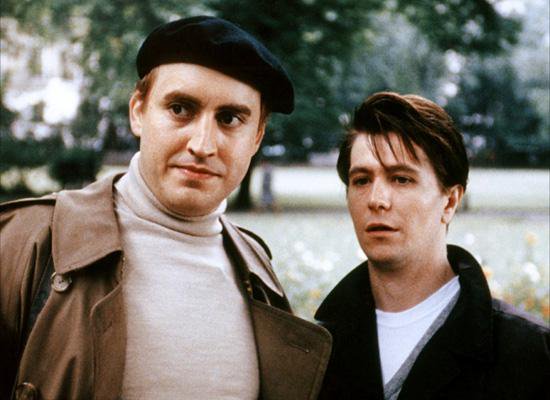
Dir.: Stephen Frears; Cast: Gary Oldman, Alfred Molina, Vanessa Redgrave, Frances Barber, Julie Walters, Wallace Shawn; UK 1987, 105 min.
Portraying the relationship between playwright Joe Orton and his lover and erstwhile collaborator Kenneth Halliwell, director Stephen Frears relies on a brilliant script by Alan Bennett, based on the Orton biography of John Lahr. But it is not the brutal ending, in the summer of 1967, which shocks up most but the seamy atmosphere dominating London at the time, a far cry from the “swinging’ myth of the late Sixties: instead, Frears’ London is a sordid mixture of repression, provinciality and squalidness.
Joe Orton (Oldman), coming from a lower-middle class family in Leicester, met Kenneth Halliwell, six years his senior, when they were both studying at RADA in 1951. Halliwell had a cultured and sophisticated middle-class education, and Orton, whose highest achievements were in shorthand typing, had never met anyone quite like him before. During the course of their relationship, the tables were turned, and new power structure emerged; with Orton not only becoming a successful playwright, but also spreading his wings sexually, cottaging in the seedier parts of Islington, which at the time was still quite run-down.
For a decade, Orton and Halliwell had collaborated writing novels and plays (which are lost), but after both men were convicted to six months imprisonment, in 1962, for defacing highbrow literary works they stole from the local library (Halliwell decorated the walls of their bedsit with collages torn from the book’s pages), Joe developed a new creative energy, which set him apart from Halliwell. As Orton’s agent Peggy Ramsey (a playful Vanessa Redgrave) put it, “Halliwell became the first wife”, being discarded after the success of the ‘husband’.
Some scenes are set in Orton’s home in Leicester, where we meet his sister (and executor) Leonie (Barber) and mother Elsie (Walters in an early caricature). Again, it is surprising, that the ambience of Orton’s family home is not that much different that of the couple’s flat in Noel Street, Islington. And the meetings between Ramsey and John Lahr (Shawn), are more gossiping sessions than literary discourse. When Ramsey gains access to the flat after the murder/suicide, she steals Orton’s diary and Halliwell’s final note: “If you read this, all will be explained. P.S. Especially the latter part”. Even after the gruesome find, Ramsey acts with an egoistical meanness, which is symptomatic of many of the film’s characters.
Oldman is superb as the cocky Orton, who, after all the repression of provincial Leicester, is hell bent on enjoying himself in London. Not to demean Leicester, which has spawned many a talent: Richard and David Attenborough; Michael Kitchen; Graham Chapman; Bill Maynard; Kate O’Mara; Una Stubbs; Julian Barnes, Sue Townsend and Frears himself, to name a few). Whilst aware of Halliwell’s deteriorating mental health, Orton does not see the danger signs: whilst on holiday in Morocco, Halliwell violently destroys Orton’s typewriter. Orton, as narcissistic as Halliwell, seems to get younger during the narrative, whilst Halliwell succumbs to early mid-life depression. Molina’s terrific Halliwell cannot believe that life is slipping through his fingers: he is literally shrinking as a personality, whilst Orton grows into a public figure, even meeting Paul McCartney and writing a film script about the Beatles.
The ending is tragic, but somehow logical: Halliwell feels his life is being diminished by Orton – who is also demeaning his sexually, he cannot bear the reminder of his own failure – in contrast to Orton’s success – neither can be live with the fact that he killed his ‘other half’. Frears’ direction is absorbing, capturing the sadness of a tragic love story and well as the caustic humour the two enjoyed until things went wrong. AS
ON RELEASE COURTESY OF PARK CIRCUS FROM AUGUST 5 2017